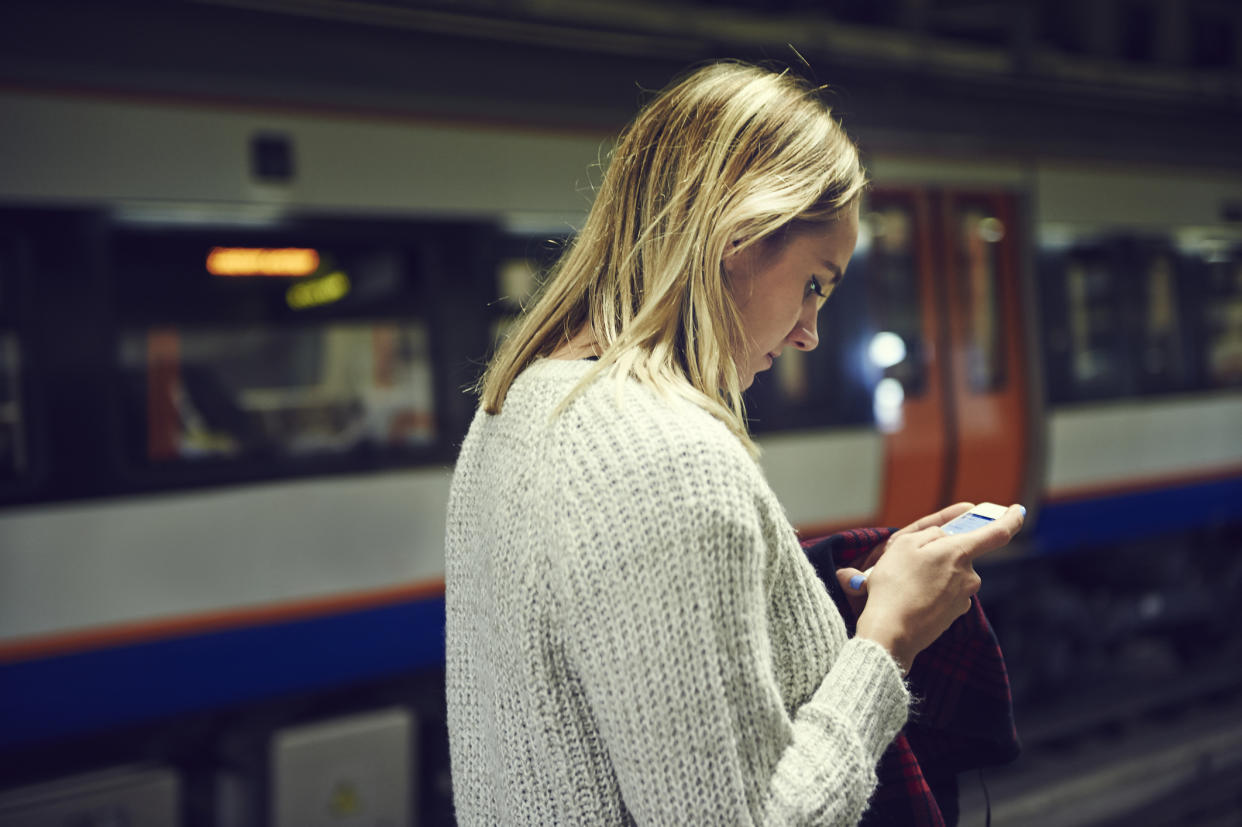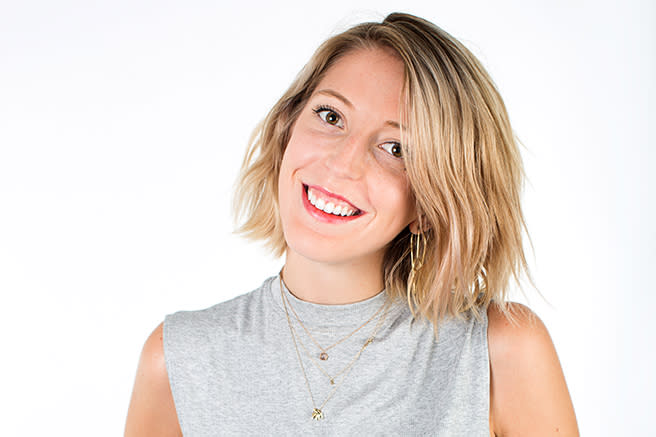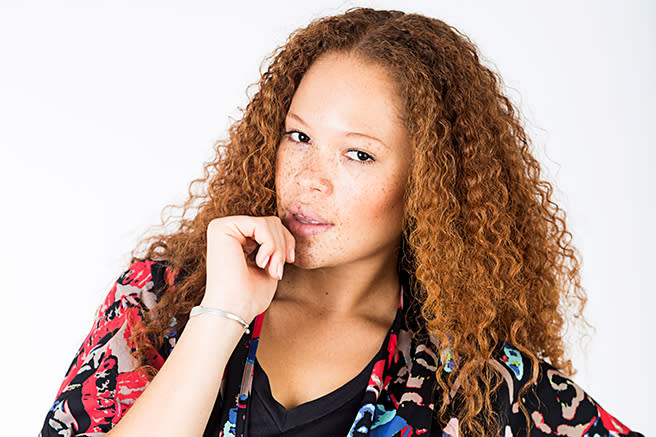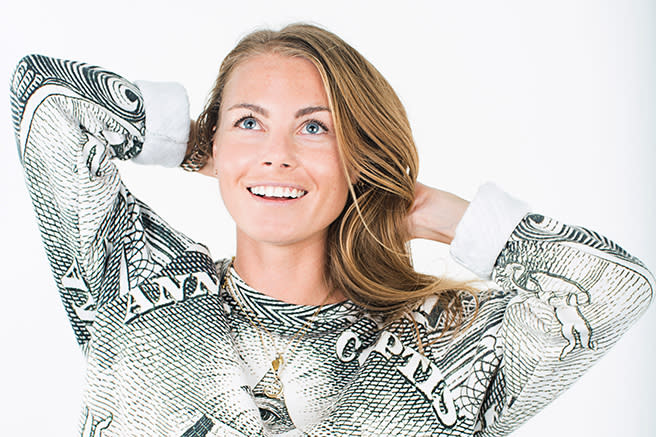How Instagram Is Ruining Our Self Esteem

When Trop Rouge's Christina Caradona revealed to her 131,000 Instagram followers that she doesn't show her "whole face" in selfies (which often garner upwards of 3,000 'likes') because she is "self conscious" of her "weird eyes," her disbelieving fans responded with as much amazement as they did incredulity. "What?! You're so beautiful!" and "I would give anything to look like you! Are you crazy?! What is wrong with you!?" were just some of the comments the post received.
Caradona's refreshing honesty ("We all have our insecurities and believe it or not I have A TON," she wrote in the post) got me thinking about self-perception on social media-namely, the lengths many of us go to hide flaws that are often invisible to others, in order to curate our best online selves. I have friends who retouch their blemishes, others who pose specifically to hide their "big nose" or "chubby cheeks," and some who ask other friends to untag them because they don't like the angle-or even ask to have a photo taken down because of the way that (they think) they look.
Jenny Albright, who is also one half of the popular DJ duo Daddy Likes, admitted to asking her ex-boyfriend to delete a beach picture from last summer because "I didn't like the way my body looked," she said. "I was leaning over in a way that makes your stomach roll. It just wasn't a good look." Interestingly, I was also in this picture, and only remember envying how beautiful I thought she looked-radiant and tall with perfect hair-and thinking how short I appeared next to her. Another friend, Nazy Karimi, who works as David Byrne's assistant, told me how she taught herself to smile in photos without showing her teeth because, after a bicycle accident a few years ago, she only sees them as being "different" or "off." "Friends of mine always show me pictures [of me] and say, 'You look so great in this photo!' and I'm like, 'Are you kidding me! Untag me, or take it down.' The photos they love are me with a big smile…so obvious,' she confessed, with a cheeky grin. "I love smiling and I love laughing, but when I actually see it I just think, 'Oh, does that look normal?' But I'm working on it."

Warped self-perception is nothing new, however. Last year, alongside its now famous Real Beauty Sketches, Dove published survey data which asserted that "over half (54%) of women globally agree that when it comes to how they look, they are their own worst beauty critic, which equates to a staggering 672 million women around the world." But how does this affect us when you add social media into the mix? In real life we may spend years trying to 'find ourselves;' but on social media, with 60 million images uploaded to Instagram every day, it seems we are all trying to find a version of ourselves that gets the most positive feedback-or the most 'likes.'
Research from the University of Buffalo indicates that women who base their self-worth on their appearance are likely to post more pictures of themselves on social media seeking validation. In turn, they are also more likely to have a larger number of followers. Their pictures, which, before the advent of Instagram in 2010, were probably candid snapshots posted to Facebook with little or no thought, are now taken to reflect their best body angles, their best outfits, with their best facial features placed under the most flattering light. This can lead to a feeling of dread when a photo surfaces online, say, on another friend's Instagram account, over which they had no control. "Every girl has had that moment where they jump their friend and are just like, 'Give me your phone, you're deleting that!' Nobody wants to look bad on the Internet," said Leah Kelley, who runs the lifestyle blog Thick and Toned.
Dr. Pamela B. Rutledge, director of the Media Psychology Research Center at Fielding Graduate University and author of PsychologyToday's blog Positively Media, explained that this anxiety stems from a tendency to concentrate on specific aspects of our looks rather than the bigger picture. "We focus on the things that we're most concerned with, whether that's the perception of a physical fault such as 'my lips look too thin,' or a temporary one like 'does my sunburn show underneath my makeup?' We tend to be much harder on ourselves than others are on us," she said. "Whereas others take in an image holistically, noticing expressions of emotion and mood such as a smile, we are scrutinizing the minor details."
When it comes to self-perception on social media, selfies are, there is no better way to put it, the worst. Most people fall into two groups: You are either embarrassed to participate, tentatively posting one in fear of being ridiculed by friends (at least half of the women I interviewed for this story said they belonged to this group but will post selfies anyway, only to later question the image they chose, stewing over whether it really was, in fact, a good picture of them), or they are confident enough to post one, but will often add filters, or use retouching apps to erase 'flaws.' For the young, impressionable, and unaware, this could arguably be more damaging to self-esteem than an obviously airbrushed fashion campaign.
"There are apps out there which can change everything: your eye color, the size of your eyes, slim your cheeks," said 24-year-old model Iskra Lawrence, who helped put together the un-airbrushed 2014 charity calendar Model Kind, and says she hasn't retouched any of her Instagram images-"yet." "It is so much scarier than magazines," she said. "At least most people realize that magazines and campaigns have been airbrushed. But young girls are looking at selfies on Instagram and they're not realizing that some people are using apps to totally change what they look like."

Everyone I spoke to for this story, besides Iskra, admitted to retouching photos of themselves in some way-even if a filter was all they added. New Zealand-born model Emma Sanders, 24, and Human Gallery NYC owner, Rachael Yaeger, 27, both said they use filters to change the way they look on Instagram. "I use a filter to change the light sometimes because it can change the bone structure in your face," said Emma, who now lives in New York. Yaeger, meanwhile, uses black and white filters on her selfies because it helps to smooth out her sensitive skin. "I notice [my skin] immediately, and think that's the first thing other people will see," she explained.
Kamie Crawford, a 25-year-old model from Maryland, says she retouches her social media images "all the time," however she says she is honest with her followers about it. "Ideals of beauty are so farfetched, it feels like every single moment you have to be perfect," she said. "Usually I do underneath my eyes, dark circles or creases. I also use Perfect365, an app that can give me eyelashes because mine are really short," she revealed, adding that as a plus-size model, she leaves her body alone. Mallory Blair, the 26-year-old co-founder of Small Girls PR, will retouch acne or bags under her eyes using the 'blur' tool on popular Japanese photo apps, and like Crawford, she hopes her honesty will shed some light on a phenomenon she says is simply "reality" nowadays. "I've retouched things that, honestly, if I had taken more time focusing on the angle, like where the light was hitting my face, I probably wouldn't even have to use it," she said. "But I'll be like, 'Okay I can just really quickly add blur to that spot and I'm done.'"
Mark Zuckerberg wrote in 2012 that social media will lead to "the empowerment of people." But by conditioning us to pick ourselves apart, minor detail by minor detail, is social media just sending society spinning down a rabbit hole of self-doubt? In her thesis titled "Why Don't I Look Like Her? The Impact of Social Media on Female Body Image", Claremont McKenna College graduate Kendal Klein argues that the "ubiquitous and enduring nature" of social media has a more of a "detrimental impact to the body image concerns of college aged women than advertising or the media generally." Sure, we have always cared about how we look, but David G. Schlundt, associate professor of psychology at Vanderbilt University, explained that because people tend to be hypercritical when it comes to their own (Google-able) images, social media can lead to heightened insecurities. "What other people see as unique or interesting features, we see as flaws in our appearance," he explained. And while it is normal to want to receive positive feedback from others, which makes us feel valued and loved, he warned that using social media as a tool for validation can be dangerous. "If you put all your self esteem into looking good and having other people 'like' the way you look, this makes you vulnerable to negative feedback," he explained, adding that for most people, image dissatisfaction is manageable, but unhealthy behaviors like ineffective or yo-yo dieting-and on the extreme end, eating disorders and body dysmorphic disorder-can arise when seeking social media validation turns into an obsession. "Instagram can really get into your head," observed Karimi, who is on Facebook, but doesn't yet have a personal Instagram or Twitter account (she is in charge of the latter for David Byrne, though). "You're always checking to see how many [likes] you have."
Emily Bryngelson, an associate designer at Ann Taylor who struggled with an eating disorder as a teen, admitted to deleting selfies if they don't receive enough 'likes.' "I take selfies down all the time after I've put them up. It'll be a spur of the moment thing, like 'Oh, I look cute in that picture,' and either I don't get enough likes, or it's a few hours later and I'll be like, 'Uh, I actually hate that picture,'" she explained, adding that the proliferation of social media makes her scrutinize herself in a way she otherwise wouldn't. "Instagram makes me so anxious," she said. "I'm always looking at other women thinking, 'I wish I looked like that,' or 'I should get more in shape,' or 'I should wear cooler clothes.' If Instagram had been a factor in my past, it would have definitely made [my eating disorder] worse...I mean, young girls can now follow Victoria's Secret models and see what they look like in the 'every day.' They post selfies from bed! With nothing but their underwear on. That has got to make any woman, let alone a 13-year-old girl, feel unsure of herself."

Anyone reading this might just say, well, why don't you just delete your account? Stop using Instagram, Facebook, Twitter. But we all know it's not so simple. Comscore (2011) reported that more than 90 percent of U.S. Internet users visit a social media site each month, and a high number of 'likes' is no longer just a measure of popularity. Not only is a "strong social media presence" now a prerequisite for many, if not most, jobs, but companies have begun to look at your number of followers as both a measure of monetary value and a career determiner. And according to TIME.com, employers actually consider people without Facebook suspicious. "If you boycott Instagram, you're cutting yourself off from a lot of opportunities," said Emily. "I started posting more selfies, despite being self conscious about it, because honestly-you get so many more 'likes' when you post a selfie. And you get so many more followers."
Even Karimi admitted her social media absence is holding her back. "I have been offered some pretty wonderful opportunities, but because social media is lacking in my world...I haven't been hired because of it," she said. "I beat myself up about it for about a week, and then I realize that well, even if I did start one, I would hate it because I don't have it in me." Clearly, if we want to compete in today's society, we are required to have a real-life version and an online version of ourselves-even if the two don't necessarily align, which Iskra quickly realized after moving from London to New York to pursue her modeling career. "Originally my Instagram had a lot more family stuff, more about me as a person, but I've had to really scale that back because as a model, I have to get more followers," she said. "And what gets followers is lingerie pictures. And selfies."
Curating the 'perfect' social media self extends beyond selfies, however. Instagram enables us to put an aspirational front on our lives, to create our own brand, in a sense, like a personal magazine, meticulously curated based on things we like, or more often than not, things we know other people will like-or be envious of. Instead of posting a photo of yourself because you want to share it with friends or family, it becomes more about the 'brand of you.' Last month Garance Doré touched on this subject in a post titled Instagram vs. Real Life, writing: "The thing with Instagram, it's the difference there is between our real life and the dream life we post. Ok so we're all supposed to know it and take Instagram life with a grain of salt, but let's be honest, we all forget."
Yaeger, who is also the co-founder of Topless Blading and a part-time project manager at Gin Lane, says social media gives her the ability to showcase both her work and personal pursuits, but concedes that there is a growing disconnect between what is really going on and what people post. Her best friends think her Instagram is "a little overly curated" and she has begun to wonder whether people think she is "a) not working or b) always having fun" because her feed only highlights the "greater aspects" of her life. "The other day this guy was like, 'It seems like you're always out to coffee.' So I thought, 'Okay, maybe I need to be a little more conscious of my lax photos.' But a photo of my computer screen or e-mail is not really...interesting," she said with a laugh, before adding, "My dad is sick right now and I went upstate to see him, but I'm not Instagramming him being like, 'Love you so much, pull through.' I'm Instagramming the mountain on a hike I went on that afternoon." Blair, who is listed on Forbes 30 Under 30 for 2014, put it simply: "I think of myself as the art director of my own life on Instagram." Though she admits to being conscious of her "baby face" in pictures posted to social media, making sure to angle herself to look more her age (thus creating "higher cheekbones that might read as older"), she makes a point to be her "true self" on Instagram-and to lead by example. "If Bianca [Caampued, her business partner] and I are telling clients to be their honest, authentic selves, then, you know, we don't rearrange our desks before we take a photo, we just take a photo of it in its messy glory," she said. "If you're relatable and yourself, the right people will find you and resonate with you."
Caradona, who has nearly 10,000 Twitter followers and 25,000 'likes' on her blog's Facebook page, adheres to a similar ethos and hopes that when people look at her social media accounts, they want to be friends with her rather than feel intimidated by her. Because although the 26-year-old may come across as "confident with my shit together" on Instagram, she says she is also "this awkward scatter-brained girl trapped in an adult body, trying to figure out life without falling on my face." For this reason, she has never altered her body or her face using retouching apps because "I'm not here to make people feel bad about themselves," she said. "Flaws are beautiful."
See the full gallery of women discussing self-perception and self esteem here.
From: Elle
You Might Also Like

